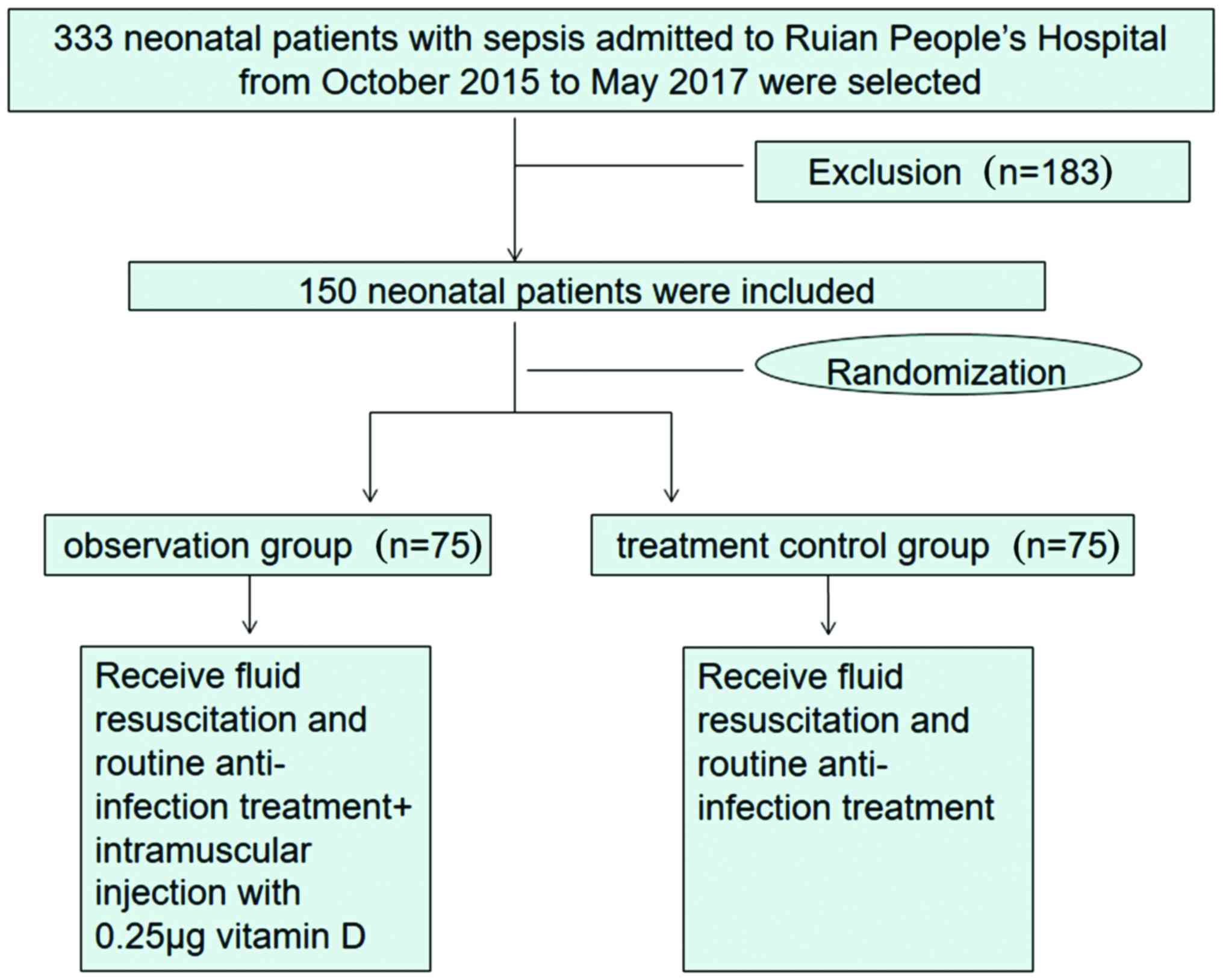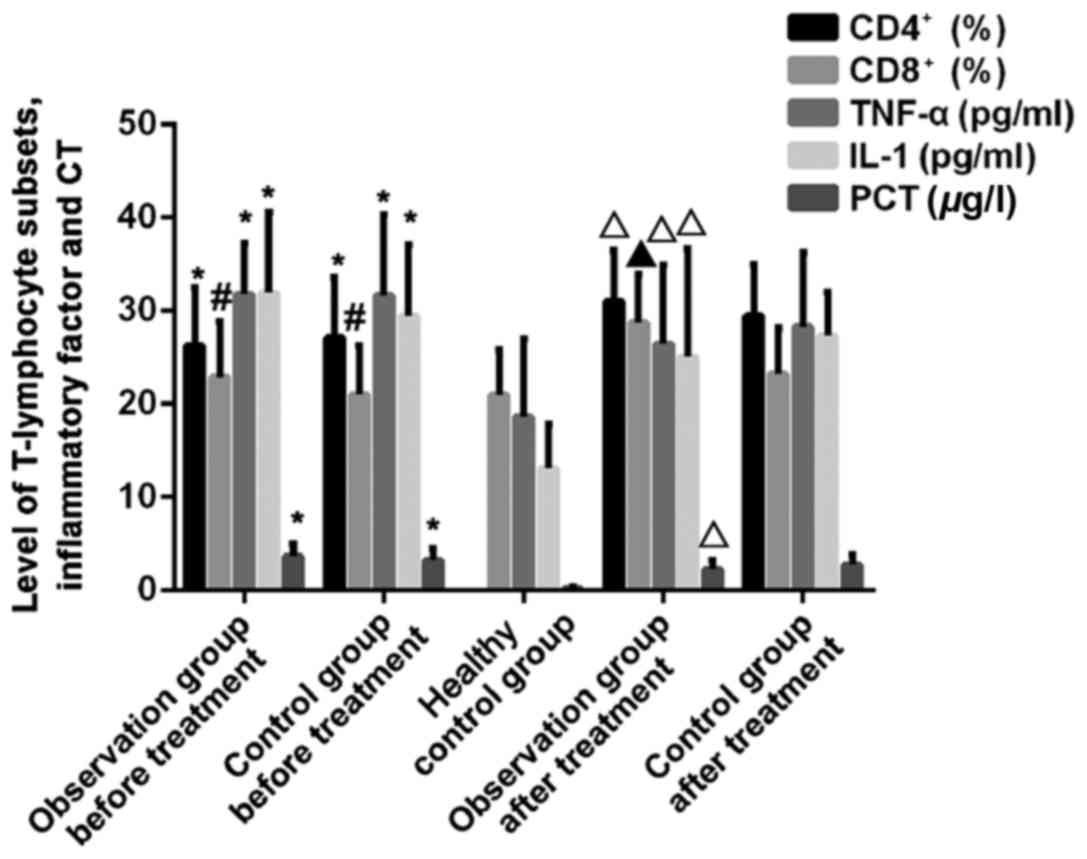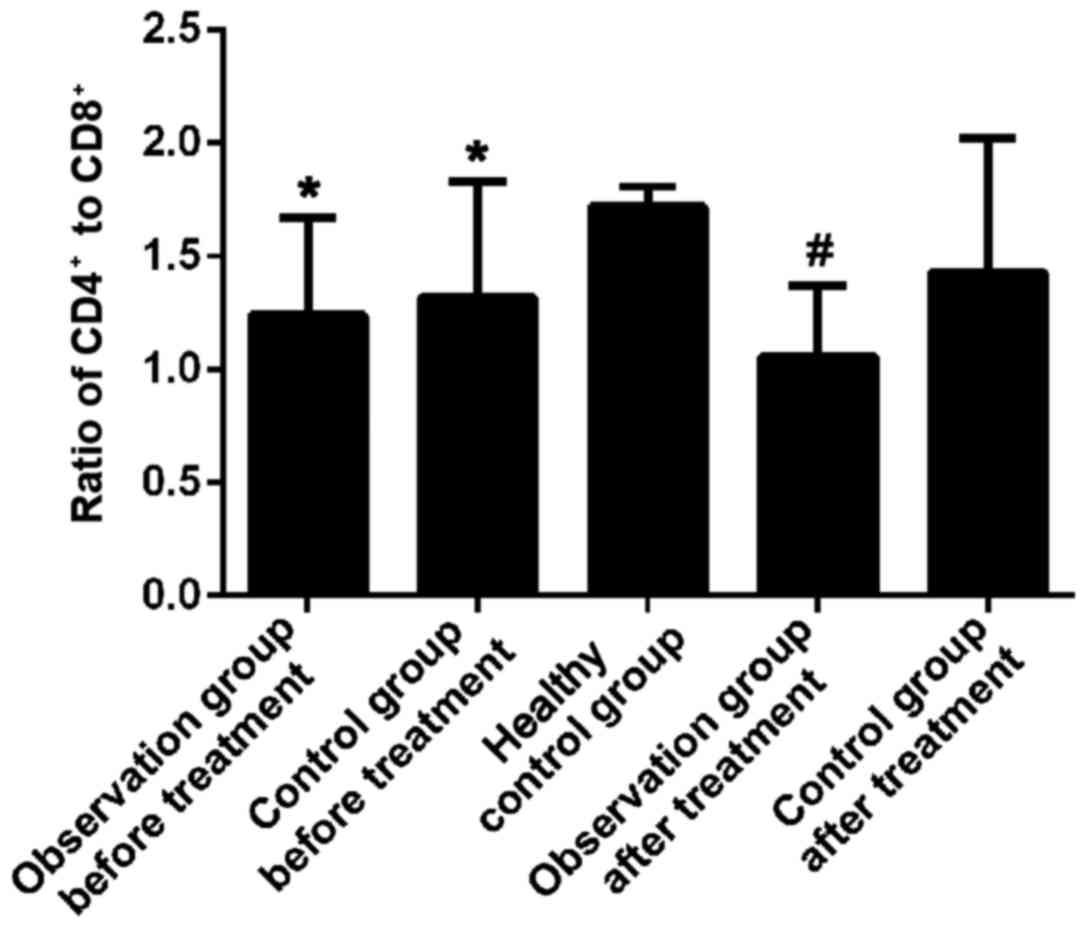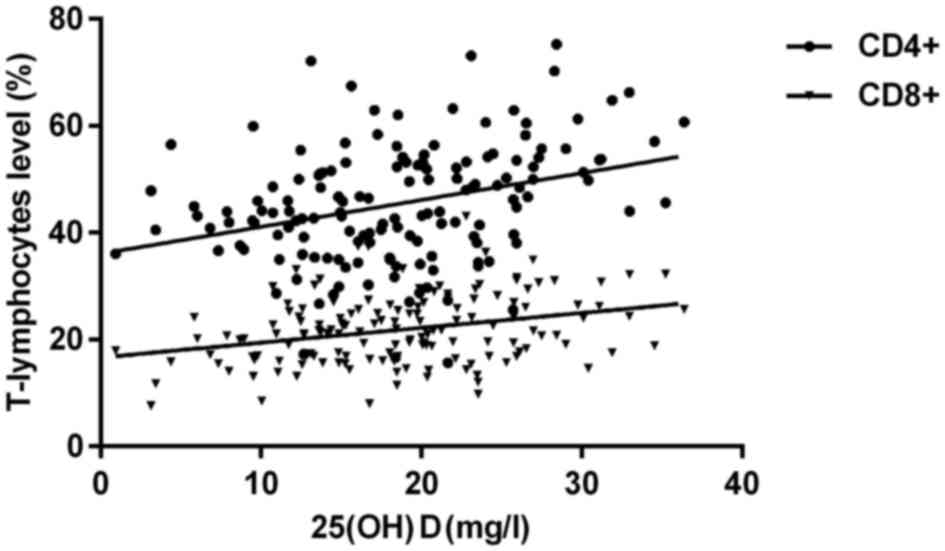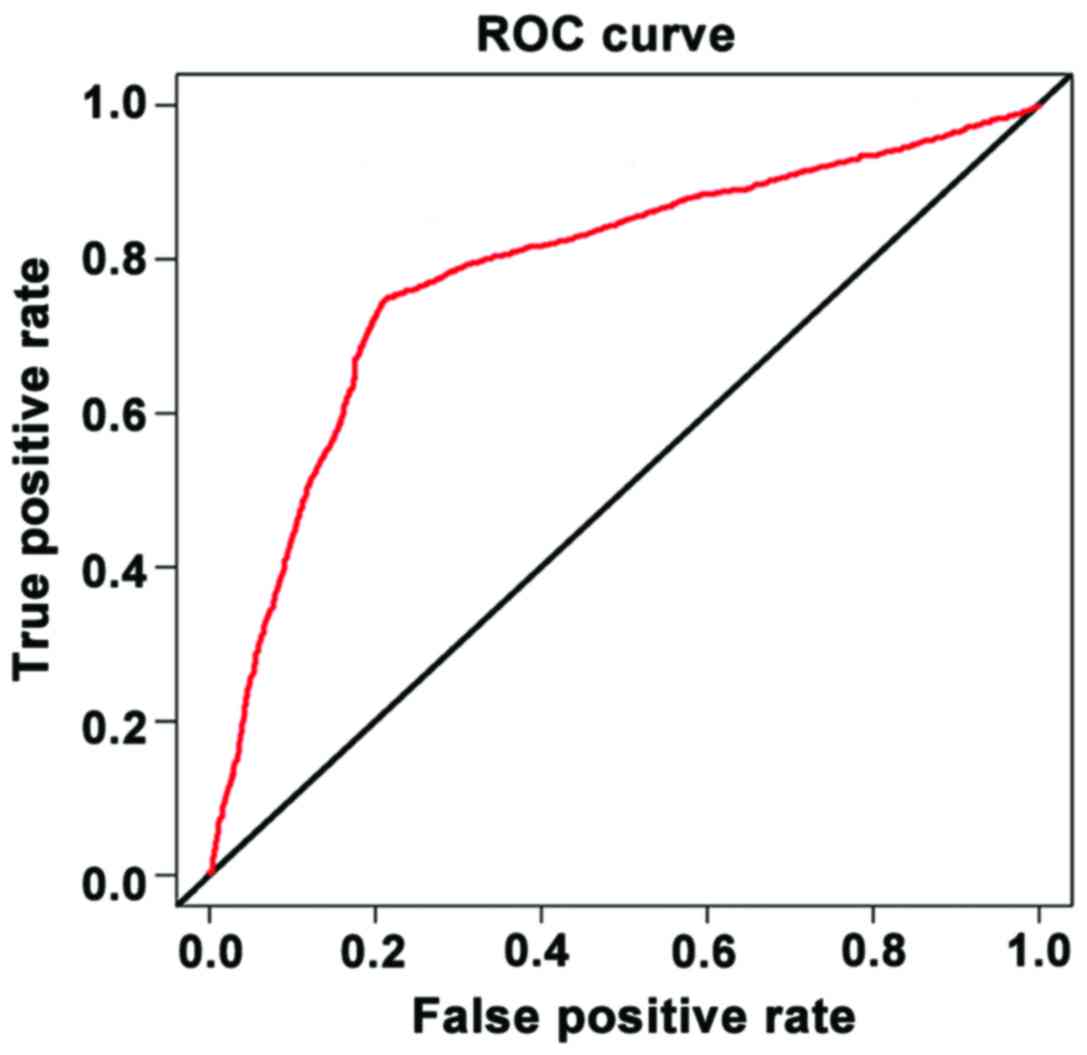|
1
|
Kempker JA, Han JE, Tangpricha V, Ziegler
TR and Martin GS: Vitamin D and sepsis: An emerging relationship.
Dermatoendocrinol. 4:101–108. 2012. View Article : Google Scholar : PubMed/NCBI
|
|
2
|
Herrmann M, Farrell CL, Pusceddu I,
Fabregat-Cabello N and Cavalier E: Assessment of vitamin D status -
a changing landscape. Clin Chem Lab Med. 55:3–26. 2017. View Article : Google Scholar : PubMed/NCBI
|
|
3
|
Wang TJ, Zhang F, Richards JB, Kestenbaum
B, van Meurs JB, Berry D, Kiel DP, Streeten EA, Ohlsson C, Koller
DL, et al: Common genetic determinants of vitamin D insufficiency:
A genome-wide association study. Lancet. 376:180–188. 2010.
View Article : Google Scholar : PubMed/NCBI
|
|
4
|
Karras SN, Fakhoury H, Muscogiuri G, Grant
WB, van den Ouweland JM, Colao AM and Kotsa K: Maternal vitamin D
levels during pregnancy and neonatal health: Evidence to date and
clinical implications. Ther Adv Musculoskelet Dis. 8:124–135. 2016.
View Article : Google Scholar : PubMed/NCBI
|
|
5
|
Chiesa C, Natale F, Pascone R, Osborn JF,
Pacifico L, Bonci E and de Curtis M: C reactive protein and
procalcitonin: Reference intervals for preterm and term newborns
during the early neonatal period. Clin Chim Acta. 412:1053–1059.
2011. View Article : Google Scholar : PubMed/NCBI
|
|
6
|
El-Mazary AM, Abdel-Maaboud M, Mohamed M
and Nasef K: Vitamin D supplementation and the risk of infections
in fullterm infants. Correlations with the maternal serum vitamin
D. Arch Dis Child. 97:A2572012.
|
|
7
|
Cetinkaya M, Cekmez F, Buyukkale G,
Erener-Ercan T, Demir F, Tunc T, Aydın FN and Aydemir G: Lower
vitamin D levels are associated with increased risk of early-onset
neonatal sepsis in term infants. J Perinatol. 35:39–45. 2015.
View Article : Google Scholar : PubMed/NCBI
|
|
8
|
Kara Elitok G, Bulbul L, Zubarioglu U,
Kıray Bas E, Acar D, Uslu S and Bulbul A: How should we give
vitamin D supplementation? evaluation of the pediatricians'
knowledge in Turkey. Ital J Pediatr. 43:952017. View Article : Google Scholar : PubMed/NCBI
|
|
9
|
Huynh J, Lu T, Liew D, Doery JC, Tudball
R, Jona M, Bhamjee R and Rodda CP: Vitamin D in newborns. A
randomised controlled trial comparing daily and single oral bolus
vitamin D in infants. J Paediatr Child Health. 53:163–169. 2017.
View Article : Google Scholar : PubMed/NCBI
|
|
10
|
Onwuneme C, Blanco A, O'Neill A, Watson B
and Molloy EJ: Vitamin D enhances reactive oxygen intermediates
production in phagocytic cells in term and preterm infants. Pediatr
Res. 79:654–661. 2016. View Article : Google Scholar : PubMed/NCBI
|
|
11
|
Han JE, Jones JL, Tangpricha V, Brown MA,
Brown LAS, Hao L, Hebbar G, Lee MJ, Liu S, Ziegler TR, et al: High
dose vitamin D administration in ventilated intensive care unit
patients: A pilot double blind randomized controlled trial. J Clin
Transl Endocrinol. 4:59–65. 2016. View Article : Google Scholar : PubMed/NCBI
|
|
12
|
Yang LR, Li H, Yang TY, Zhang T and Zhao
RC: Relationship between vitamin D deficiency and early-onset
neonatal sepsis. Zhongguo Dang Dai Er Ke Za Zhi. 18:791–795.
2016.(In Chinese). PubMed/NCBI
|
|
13
|
Cizmeci MN, Kanburoglu MK, Akelma AZ,
Ayyildiz A, Kutukoglu I, Malli DD and Tatli MM: Cord-blood
25-hydroxyvitamin D levels and risk of early-onset neonatal sepsis:
A case-control study from a tertiary care center in Turkey. Eur J
Pediatr. 174:809–815. 2015. View Article : Google Scholar : PubMed/NCBI
|
|
14
|
Xiao T, Chen LP, Liu H, Xie S, Luo Y and
Wu DC: The analysis of etiology and risk factors for 192 cases of
neonatal sepsis. BioMed Res Int. 2017:86170762017. View Article : Google Scholar : PubMed/NCBI
|
|
15
|
Nzegwu NI, Rychalsky MR, Nallu LA, Song X,
Deng Y, Natusch AM, Baltimore RS, Paci GR and Bizzarro MJ:
Implementation of an Antimicrobial Stewardship Program in a
Neonatal Intensive Care Unit. Infect Control Hosp Epidemiol.
38:1137–1143. 2017. View Article : Google Scholar : PubMed/NCBI
|
|
16
|
Omran A, Maaroof A, Saleh MH and
Abdelwahab A: Salivary C-reactive protein, mean platelet volume and
neutrophil lymphocyte ratio as diagnostic markers for neonatal
sepsis. J Pediatr (Rio J). 94:82–87. 2018. View Article : Google Scholar : PubMed/NCBI
|
|
17
|
Stritzke A, Mohammad K, Shah PS, Ye XY,
Bhandari V, Akierman A, Harrison A, Bertelle V and Lodha A: Use and
timing of surfactant administration: Impact on neonatal outcomes in
extremely low gestational age infants born in Canadian Neonatal
Intensive Care Units. J Matern Fetal Neonatal Med. 31:1–8. 2017.
View Article : Google Scholar : PubMed/NCBI
|
|
18
|
McCarthy RA, McKenna MJ, Oyefeso O, Uduma
O, Murray BF, Brady JJ, Kilbane MT, Murphy JF, Twomey A, O' Donnell
CP, et al: Vitamin D nutritional status in preterm infants and
response to supplementation. Br J Nutr. 110:156–163. 2013.
View Article : Google Scholar : PubMed/NCBI
|
|
19
|
Chen J, Bruce D and Cantorna MT: Vitamin D
receptor expression controls proliferation of naïve
CD8+T cells and development of CD8 mediated
gastrointestinal inflammation. BMC Immunol. 15:62014. View Article : Google Scholar : PubMed/NCBI
|
|
20
|
Cantorna MT, Snyder L, Lin YD and Yang L:
Vitamin D and 1,25(OH)2D regulation of T cells. Nutrients.
7:3011–3021. 2015. View Article : Google Scholar : PubMed/NCBI
|
|
21
|
Watkins RR, Lemonovich TL and Salata RA:
An update on the association of vitamin D deficiency with common
infectious diseases. Can J Physiol Pharmacol. 93:363–368. 2015.
View Article : Google Scholar : PubMed/NCBI
|
|
22
|
Barragan M, Good M and Kolls JK:
Regulation of dendritic cell function by vitamin D. Nutrients.
7:8127–8151. 2015. View Article : Google Scholar : PubMed/NCBI
|
|
23
|
Bahrami A, Mazloum SR, Maghsoudi S,
Soleimani D, Khayyatzadeh SS, Arekhi S, Arya A, Mirmoosavi SJ,
Ferns GA, Bahrami-Taghanaki H, et al: High dose vitamin D
supplementation is associated with a reduction in depression score
among adolescent girls: A nine-week follow-up study. J Diet Suppl.
15:173–182. 2018. View Article : Google Scholar : PubMed/NCBI
|
|
24
|
Wang EW, Siu PM, Pang MY, Woo J, Collins
AR and Benzie IFF: Vitamin D deficiency, oxidative stress and
antioxidant status: Only weak association seen in the absence of
advanced age, obesity or pre-existing disease. Br J Nutr.
118:11–16. 2017. View Article : Google Scholar : PubMed/NCBI
|















